| |
The Man Who Invented Friendship
Research into the story of Merle A. Potter started with one
photograph and a very brief citation stating that he was the first
American military governor in Bad Kissingen in the post war period.
There appeared to be very little information beyond this and I only
worked on the story off and on. Then, with a little bit of luck and
the assistance of a number of people in Germany, Minnesota and New
York, suddenly the story of this fascinating man began to come
together. Six thousand words later, a tribute to one American
soldier who came to the Kurstadt, Merle Addison Potter. He was a
citizen, a soldier, a showman and a man with vision. If you ever
participated in any of the social activates run by the German -
American Club - Kontact in either Bad Kissingen or the dozens of
other cities across Germany where club events invited servicemen and
Germans to join together in friendship, it all began with Potter, a
Prince and the ability to shake hands.
The early civilian career of a Minneapolis newspaper man turned
soldier starts at Part 1.
For Potter’s Army career in Bad Kissingen and Berlin, please start
at Part 2.
NOTE: All photos are thumbnails, click
to bring up the full-sized picture.
Merle A. Potter is the most famous
American you have never heard of. He was a newspaper man and
a showman, a historical researcher and a soldier, a radio
talk show host, a humanitarian, a diplomat and an impossible
ham. His newspaper columns were read throughout the upper
Midwest, his good works spanned two continents and have
lasted seventy years. Army generals slapped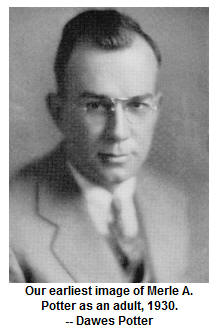 him on the back,
fired him, and then rehired him. He came to know German
nobility, stared into the face of absolute evil and found
goodness in the vanquished enemy. He sponsored dozens of
newspaper contests, tried to give away a monkey and
relentlessly organized charity drives. In return, all he
asked was that in the first paragraph of any article
recalling his many activities, the name - Merle A. Potter -
should be prominently featured. him on the back,
fired him, and then rehired him. He came to know German
nobility, stared into the face of absolute evil and found
goodness in the vanquished enemy. He sponsored dozens of
newspaper contests, tried to give away a monkey and
relentlessly organized charity drives. In return, all he
asked was that in the first paragraph of any article
recalling his many activities, the name - Merle A. Potter -
should be prominently featured.
He knew movie stars and everyone knew Merle. He was a most
improbable choice to be the first U.S. Army military
governor of Bad Kissingen and he accompanied combat units in
vicious assaults. In the rear areas, Merle Potter put on
soldier talent shows in bombed out theaters. He started a
German - American friendship society that evolved into the
Association of German - American Cubs, an organization that
exists to this day. Yet for the hundreds of thousands of
words that he wrote, and the millions of people who were
entertained, for the countless lives that he touched, for
all the good works and all the people who would remark, “
ohh that Merle … what will he do next? “, Merle A. Potter is
an American hero unsung.
Few things are certain in life, we shall be taxed, at some
point we shall slip the bounds of this surly earth … and
that in every library in the state of Minnesota, there is a
copy of Merle A. Potter’s book. From the newspaper morgue
clip files, the used bookshops and the internal records of
the German - American Clubs, let’s give Merle his do. Could
we do less for the man who invented friendship? Merle
Addison Potter was bright, a man of convictions and strong
opinions and in the end, a man who would realize he might be
wrong and should change his mind. Merle, we know you ‘re
playing cards with Gable, Bogart and Lorre but turn an ear
as we finally sing your praises!
Merle A. Potter in the Pre War Years
Merle Addison Potter was born in Corwith Iowa in 1894. His
middle class family had the resources to send Potter to the
Shattuck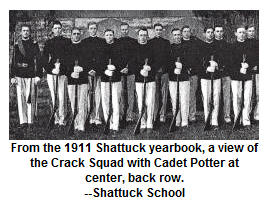 School, a private military high school in
Faribault, Minnesota. He made friends here who would
influence his career many decadeslater. Following
graduation, he enrolled at the University of Minnesota in
Minneapolis and was a member of their first journalism
class. During his junior and senior years, he was the
Managing Editor of the university newspaper. Here, he met
the woman who would become his first wife, Lucy Howe, a
classmate and they were married in 1917, a year after
graduation. School, a private military high school in
Faribault, Minnesota. He made friends here who would
influence his career many decadeslater. Following
graduation, he enrolled at the University of Minnesota in
Minneapolis and was a member of their first journalism
class. During his junior and senior years, he was the
Managing Editor of the university newspaper. Here, he met
the woman who would become his first wife, Lucy Howe, a
classmate and they were married in 1917, a year after
graduation.
Merle initially tried his hand in retail back in Iowa.
Neither selling tires or lumber seemed his true calling and
with four years of journalism training, Potter soon found an
entry level position with the Mason City Globe Gazette.
Running copy from reporter’s desks, fetching coffee and the
dozens of other jobs associated with the position of “
office boy “, may have been a great ground level starting
point but Potter had bigger ideas and for two years, he
published his own newspaper apparently as a very limited
edition, The Waukon Standard.
In 1925 Potter’s father in law died and he and his wife
returned to Minneapolis. Probably with the help of friends
from journalism school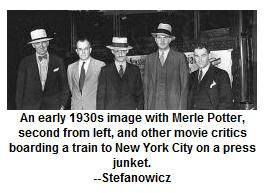 days he landed a job with the
Minneapolis Journal newspaper. days he landed a job with the
Minneapolis Journal newspaper.
The newspaper business was a crowded field in the upper
Midwest in the 1920s. Between Minneapolis and Saint Paul, no
fewer than six separate newspapers were published. The
dailies hit the street at all hours. There were morning
editions, newspapers that printed only afternoon runs, some
covered the Twin Cities and immediate suburbs exclusively,
some offered state and regional coverage. Long before
television, newspapers and radio were the primary sources
for daily news and entertainment.
Merle Potter had that unique skill in writing of a breezy
style, solid research and a keen ability to, on occasion,
never let some of the facts get in the way of a good story.
He was that type of guy who would say, “ I’ll buy you a
beer, then you buy me a beer … and then we’ll get the
bartender to pick up the tab.” and then he could pull it
off. The blood beat, dreary statehouse coverage or farm news
were not his calling. Potter would ultimately find his
printed voice as a movie and theater critic, a position for
which he would readily admit, he had no formal training. His
first notoriety with the Journal, however, came as a teller
of stories recalling anecdotes of Minnesota history.
101 Best Stories of Minnesota
If ever there was a man born for the task, it was Merle
Potter as he plunged into the strange, odd, funny and
sometimes just plain weird history of the land of 10,000
lakes, one million Swedes and the occasional Ukrainian. It
is not apparent whether Potter or his editors came up with
the original idea, but the readers loved it. Potter’s
history column was prominently featured in the Sunday
edition of the Minneapolis Journal .
Scoundrels were celebrated, the thieves, heroes, gun
runners, Indian affairs agents, shady ladies and pious souls
all were recalled with varying levels of accuracy and very
little political correctness. Once the story went to print,
if some of the facts were off, readers never hesitated to
write in with the “ true “ version and Merle saved all the
letters.
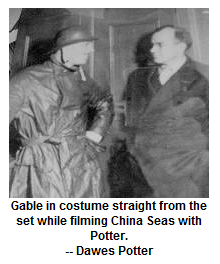
At least a part of the research related to the stories was
original, Merle Potter appears to have spent much of the
late 1920s crisscrossing the state gathering the facts at
hand, historical societies - libraries - fishing supply
stores, anyone with a good story to tell found a willing
listener in Potter. An affable public speaker, as the
stories gained a popular following so to did his public
speaking career and for a small fee, the Blue Earth Ladies
Luncheon Society or the Finnish Farmers Fraternal Front
could get Merle, in his trademark suit and wire rim glasses,
recalling Anoka’s Rum Rebellion. Long before Garrison
Keillor, Merle A. Potter was blazing the trail.
In 1931, Potter went to print with the book 101 Best Stories
of Minnesota based on the best of his Sunday columns, fact
corrected and buffed up for the hard cover market. With a
populist touch and pre publishing marketing savvy, Potter
hit upon the idea to get people talking about the book even
before it was on the shelves. In what would become a
trademark Potter ploy, he announced a contest to find a
young artist to assist in the artwork that would help tell
the stories. The much heralded winner was a local student at
the University of Minnesota and the book was a success
throughout the upper Midwest. Within six months, a second
edition was ordered. Sometime thereafter, a local Saint Paul
artist created a beautiful illuminated map of Minnesota
illustrated with cartoon vignettes borrowed from The 101
Best Stories. It is believed that the poster became a
limited edition print, Merle and a friend came upon the idea
of selling the map as a jig saw puzzle. It was not a huge
success but this was the height of the economic depression
and every few dollars counted.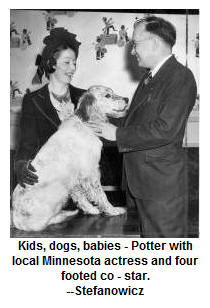
In 1958, the book was republished as part of the Minnesota
Centennial Celebration. If you are interested in a sample
story, check out the
Park Rapids Saloon Raid.
The broadsheet newspapers in the Twin Cities were engaged in
fierce competition to get the big story fast in the 1930s.
This was not limited to just “ hard “ news, celebrity
journalism and widespread popular interest in the affairs of
Hollywood and the stars was a fast growing phenomenon and
there were a lot of theaters and movie houses in the
Minneapolis and Saint Paul and an audience wanting to know
what the critics thought. A newspaper man who could generate
“ buzz “ before the word was coined, was a precious find.
Merle A. Potter flatly admitted that he had no specific
background in live theater criticism or movie reviews, but
he knew what he liked and was generally plain spoken about
it. This was a perfect match for his reading audience but
many writers could do this. With the notoriety provided by
the Journal history stories and book success, Potter
realized that a story about the movies was good, a story
that featured his name prominently was better and if it all
could be linked to a contest, instant success!
Interestingly, in Merle Potter clip files and article
morgues throughout Minnesota, not too many of his reviews
were saved. Now and then, a surviving opinion piece on a
movie or a rather long winded review of a play. What was
saved by librarians were dozens of newspaper clippings of
Potter sponsored contests, promotional events and charity
shows. There may have been Ed Sullivan in New York City, but
the upper Midwest and the Twin Cities had Merle Addison
Potter.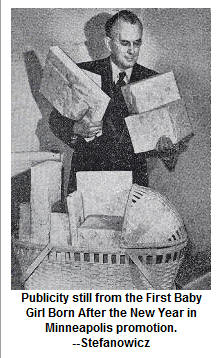
The Birth of the Buzz
Potter continued his work with the Journal through the late
1930s until the paper was purchased and shuttered by the
rival Minneapolis Times -Tribune. A brief period without the
spotlight and then Merle burst upon the local stage. The “
Trib “ hired Potter and offered him a wide ranging Hollywood
- Minneapolis gossip and review column. Apparently, the
marching orders were, “ if there is no news - invent some
news - just get that Potter name in big print on the page “.
Soon there were contests everywhere:
What are the Years Best Movies: 100 winners based on their
selections coming closest to Potters selections.
How Shall We Rate the Movies: the winning system was an ’A ’
based system - one A was bad - AAAAA was great.
First Baby Girl Born In Minneapolis Contest: Potter
surrounded by prizes waits for the New Year and the first
little girl born in the Twin Cities.
Then there was the famous Name My Column contest: the actual
ground rules for the contest are lost but Potter wanted
something short and pithy. He certainly was not short of
ideas but really wanted to draw the public in and well over
125,000 entries were received. Potter was the sole and
absolute judge with prizes provided by local merchants in
exchange for an in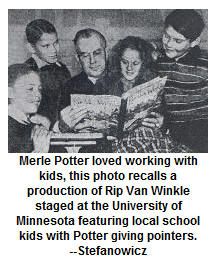 print plug. Here, a very partial list of
what was at stake: a $50 dollar sack of Occidental flour,
Emerson radio, Dinty Moore ham, a new men’s or lady’s hat, a
men’s or lady’s wallet, lady’s beauty treatment and … far
down the list but there nevertheless, a free goat, a free
live hog and, in a cage, a gift from the comedy team of
Laurel and Hardy, who had passed through the Twin Cities, a
monkey purchased from the local zoo. print plug. Here, a very partial list of
what was at stake: a $50 dollar sack of Occidental flour,
Emerson radio, Dinty Moore ham, a new men’s or lady’s hat, a
men’s or lady’s wallet, lady’s beauty treatment and … far
down the list but there nevertheless, a free goat, a free
live hog and, in a cage, a gift from the comedy team of
Laurel and Hardy, who had passed through the Twin Cities, a
monkey purchased from the local zoo.
Potter realized, the monkey in many ways, was the star of
this show and as the contest progressed, the animal was
prominently featured. Then a crisis, it escaped and was
running free in the huge Orpheum Theater. This propelled a
few more columns, should a new contest be started for the
person who captures the beast? It all ended well in the end.
The winner of the column naming contest was a very
photogenic local young woman prominently displayed with a
delivery truck full of prizes, across a full page in the
Tribune. There were photos featuring the girl, the goat, hog
and the delivery truck, and even the girl and the monkey.
The winning column name: Your Times.
There were newspaper junkets to Hollywood with the critics
from the surviving Twin Cities papers boarding a railcar
together for a few days of cards and gossip before arriving
at the Mecca of media buzz. There was a much publicized feud
with a local stage actor; Potter wrote he could do just as
good a job in the role. After many columns celebrating the
made of print spat, Potter got his chance. He would play the
role of Jeter Lester in Tobacco Road and everyone would let
the audience decide. Newspaper were sold, the crowds loved
it and there were handshakes when it was all done.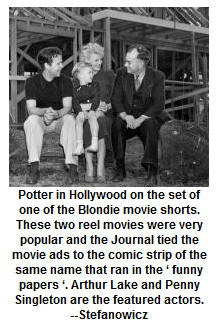
There were short articles featuring photos of Potter and
various stars as they visited the Midwest to publicize new
releases. There were Potter sponsored and hosted talent
shows and a very memorable series of Christmas movie cartoon
shows for local children hosted by the owners of a
Minneapolis movie theater chain. As expected, Potter was the
Master of Ceremonies, all widely publicized in the Tribune.
Potter even organized a local talent pageant that visited
the Minnesota State Prison during the holidays to bring some
cheer to the otherwise gray lives of the inmates. Dawes
Potter, one of Merle’s sons, recalled many years after these
events, the Christmas shows for both the children and the
inmates were among his father’s favorite memories of the
time.
In this immediate pre World War II period, Potter became
involved with a grass roots charity drive in the upper
Midwest that aimed to bring relief to the people of Finland
who had suffered greatly during their war with the Soviet
Union in 1939. It was an activity that offered limited
publicity but affected Potter greatly.
Merle A. Potter was in print, on the local radio and feted
by the National Association of Motion Picture Critics. He
was even appointed as the upper Midwest Regional President
of the organization This was very much the high point of his
career. And then it suddenly ended. Newspaper consolidation
in the Twin Cites occurred again with the rival Minneapolis
Star purchasing the Tribune and surprisingly killing
Potter’s column. Although the depression was ending, Potter
was without a job and prospects with the surviving Twin
Cites papers did not appear good. He accepted a job in 1940
with The Minnesota Amusement Company, a theater and movie
house holding company run by a prominent businessman
Benjamin Berger.
Berger was a wildly successful businessman in the Twin
Cities. Beyond the theaters, film distribution business and
local restaurant, he owned in later years both the
Minneapolis Lakers, forbearer of the Los Angeles Lakers and
the Minneapolis Millers, a semi pro hockey team. He was a
leader in the local Variety Clubs that had often featured
Potter as a speaker so when he heard Merle had lost the
newspaper column, he offered the job of managing a pair of
Berger theaters. Merle accepted but it was not a good match.
Success was measured by box office receipts against theater
costs and Potter, as good as he was with publicity, was not
a ledger sheet kind of guy. As America entered the second
full year of World War II, Potter was looking for an exit
and in Berger’s biography, Merle A. Potter is not mentioned
|
Click on the thumbnail to
bring up the full-sized picture |
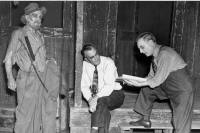
The Jeeter
Lester stunt with actor John Barton as Jeeter at left, then
Potter and the director Rick Lee. Potter challenged Barton
to let him play the role one night and Barton accepted.
--Stefanowicz
|
|
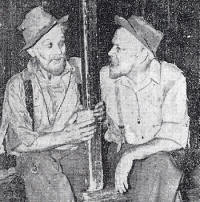
Barton and
Potter, both in costume in the play Tobacco Road.
--Stefanowicz
|
|
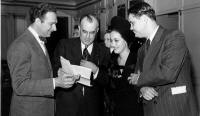
Potter with
Hollywood actors as they passed through the Twin Cities.
From left, Buck Herzog, Potter, Dorothy Lamour and Keith
Wilson.
--Stefanowicz
|
This
photo was not in the best of condition, Bob Hope at left
tugs on Potter’s ear, then Merle and unknown actress in
Hollywood.
--Dawes Potter |
|
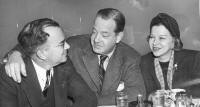
The things a newspaper man had to do to land the story!
Potter with Alan Dinehart and Glenda Farrell enjoy breakfast
while waiting for the morning papers and breaking reviews of
the new play ‘ Thanks for My Wife’.
--Stefanowicz
|
|
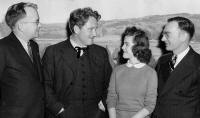
Another
successful promotion as Potter escorts the two first place
winners of his Talent Hunt radio contest to Hollywood and on
to the set to meet Spencer Tracy.
--Stefanowicz
|
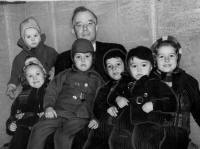
Merle with a
group of satisfied customers at one of his annual Children’s
Christmas Movie Parties in Minneapolis.
.--Stefanowicz
|
|
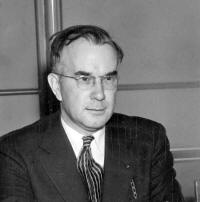
Potter feted by
the National Movie and Theater Critics Organization at an
awards ceremony.
.--Stefanowicz
|
|
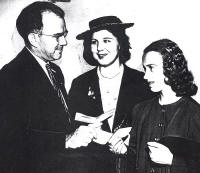
Another
successful promotion as Potter escorts the two first place
winners of his Talent Hunt radio contest to Hollywood and on
to the set to meet Spencer Tracy.
--Stefanowicz
|
| |
|
|
|
|
In mid 1943, Merle Potter resigned
from the Berger Amusement Company. He was not happy in the
position and was forty - nine years old. By the accepted
standards, he was too old for active duty service yet he
somehow wanted to contribute with the country at war.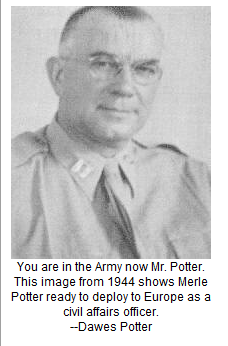 When
Potter had attended the Shattuck school, it was a strict,
all male military prep school. Doubtless, many of the
instructors had seen service in the Civil War and on the
Great Plains fighting Indians and this had left an
impression. The 101 Best Stories had been dedicated to the
Minnesota Auxiliary of the American Legion and Potter had
run promotional events at downtown movie theaters aimed at
WW I veterans. With two sons already of active duty as
ensigns in the Navy, Potter must have considered himself
very lucky when he applied and was accepted to a position
with the American Red Cross that could potentially lead to
an assignment on one of the distant fronts of the war. With
no medical experience and marginal executive ability, Potter
departed for six weeks of training. Perhaps they needed a
publicist. When
Potter had attended the Shattuck school, it was a strict,
all male military prep school. Doubtless, many of the
instructors had seen service in the Civil War and on the
Great Plains fighting Indians and this had left an
impression. The 101 Best Stories had been dedicated to the
Minnesota Auxiliary of the American Legion and Potter had
run promotional events at downtown movie theaters aimed at
WW I veterans. With two sons already of active duty as
ensigns in the Navy, Potter must have considered himself
very lucky when he applied and was accepted to a position
with the American Red Cross that could potentially lead to
an assignment on one of the distant fronts of the war. With
no medical experience and marginal executive ability, Potter
departed for six weeks of training. Perhaps they needed a
publicist.
At just about this time, the Army was actively combing the
rosters of the Red Cross and similar organizations for
potential officers willing to be trained in civil affairs
administration. Many of these candidates were similar in age
and background to Potter, in their forties, university
trained and well established in civilian careers with a
willingness to pull on Army boots. Merle A. Potter was
absolutely in the right place at the right time and was
transferred from the Red Cross into a highly modified
Officer Candidate School run in Pennsylvania. Upon
graduation, he was commissioned as a Captain and sent to
England where the civil affairs teams were being assembled
and would receive further training. The next time we find a
specific Potter citation in the newspapers, the invasion of
Europe has already occurred, Potter is deep in France and as
expected, is putting on a show.
The Virginia Safford column in the 13 December 1944 Star
reported that Potter had written to Berger recalling his
duties as a Special Services officer. He was in France, not
far from the German border and had a host of duties running
a soldier center at a bombed out Luftwaffe base. He oversaw
a Post Exchange, Army Post Office, barber shop and mobile
Recreation Center for the troops. In the off time, he
scoured local villages for under employed chefs who were not
adverse to cooking a special meal for the Captain. He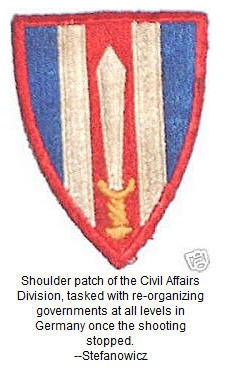 concluded that he was the impresario for a “ Warehouse
Follies Show “ put on by the troops. Safford concluded her
column, “ High Living! “
concluded that he was the impresario for a “ Warehouse
Follies Show “ put on by the troops. Safford concluded her
column, “ High Living! “
A few months later, there was a burst of Potter activities
in the Minnesota papers. In a special report to the
Minneapolis Sunday Times dated 25 March 1945, Potter wrote a
first hand account of observing troops during the first
rubber boat assault over the Rhine. In part,
“ Suddenly the night’s stillness was pieced by the ratatatat
of small arms fire on the other side of the Rhine, and the
show entered a more sobering phase. Quickly came our
retaliating fire, tracer fire arched over the river seeking
vulnerable targets. The enemy came in with sprays of
missiles from machine guns and then from hills in back of us
came thundering blows of our artillery blasting and
shredding the air. Now and again the din would subside for a
few minutes and then it would resume with renewed vigor.
From that window overlooking the river during one quiet
interlude, I heard doughboys voices shouting, ‘ come out of
that house you dirty ……’ Another time I heard a German
soldier scream from pain and then become suddenly quite. “
The Potter article flood continued over the next few weeks.
He had been made Public Relations Officer of the XII Corps,
part of Patton’s Third Army, and was a member of Lieutenant
General Manton S. Eddy’s staff, with easy access to wire
services to get the story out. This was another stroke of
extraordinary good luck. Potter and Eddy had known each
other as cadets at the Shattuck School thirty years earlier.
Not affiliated with a home town paper, Potter sent his
reports to old friends back in Minneapolis who readily took
them to print. He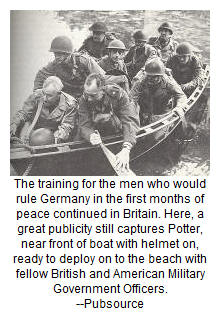 wrote that he had escorted VIPs through
the Corps area, run a refugee camp for a few days, been
harassed by German buzz bombs and had come to admire the
British troops he had met. Then this sobering statement, wrote that he had escorted VIPs through
the Corps area, run a refugee camp for a few days, been
harassed by German buzz bombs and had come to admire the
British troops he had met. Then this sobering statement,
“ I find the German adults docile - not a spark of fight
left in them. But the young boys are vicious little demons,
glare at you from doorways, eyes filled with hated. The
Germans have done as effective job with the Hitler Jugend (
youth ) where training starts when they are six. The world
will be better off when they are dead. “
An article printed on 23 May finds Potter reporting in from
the German - Czech border in the very last days of the war.
He had come across a steady steam of German atrocities, mass
killings and the results of forced marches of concentration
camp victims denied food or water. He summed up his brief
dispatch,
“ following the burial service (of scores of Polish Jews
found roadside) I ordered every German present to march by
the dead bodies. I did not talk to any German who did not
disclaim all responsibility for the atrocities that took
place in their midst. “
Two days later, a single paragraph ran in the papers noting
that Merle Potter, former movie critic and now Army public
relations officer can be seen in two news reels currently
playing at various Twin Cities theaters. On film, Potter is
the officer grimly directing the mass burials of victims at
the Buchenwald concentration camp.
Governor Potter, the Prince and the Cosmopolitan Club
With Europe finally at peace, Captain Potter and Lieutenant
General Eddy parted ways. Potter was posted to the job he
had trained for in England. The man who found little joy in
running Max Burger’s theaters found himself and his H level
detachment, running a Kurstadt with over fifteen thousand
war wear Germans in the town or immediate vicinity. Among
his many concerns, the creation and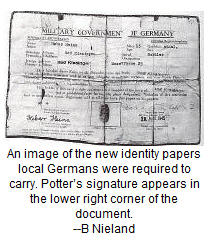 administration of an
American zone in the town, refugee control, issuing
registration papers to all Germans over the age of eight,
enforcement of various Army of Occupation laws passed down
from his superiors, coordination with U.S. units that had
occupied the old German barracks and hotels throughout the Kur zone, reestablishing a local German government and city
services and last but not least, insuring that the local
Military Police unit was enforcing anti - fraternization
laws. To accomplish this, Potter was assisted by three other
officers and six enlisted men. Everyone had received
intensive training in the German language, nobody really
spoke it. administration of an
American zone in the town, refugee control, issuing
registration papers to all Germans over the age of eight,
enforcement of various Army of Occupation laws passed down
from his superiors, coordination with U.S. units that had
occupied the old German barracks and hotels throughout the Kur zone, reestablishing a local German government and city
services and last but not least, insuring that the local
Military Police unit was enforcing anti - fraternization
laws. To accomplish this, Potter was assisted by three other
officers and six enlisted men. Everyone had received
intensive training in the German language, nobody really
spoke it.
The Military Government detachments varied in size and
composition depending on the amount of German territory they
would take responsibility for. An H level unit, second from
the smallest in size, was designed for a town or small city
about the size of Bad Kissingen. Sadly, Merle Potter left no
first hand record of what must have been tumultuous times
but portions of the story can be pieced together through
various sources. Some detail is very sketchy while other
parts of the story are well detailed.
Considering the town was undamaged from the war, Bad
Kissingen would have been considered a plum assignment,
there were roofs on all the buildings and the water pipes
did work. Whether General Eddy had some influence with the
assignment is unknown.
Supposedly, the Military Government Officer teams were to
have known their specific town - city or region assignment
while training in England. This part of the post war plan
proved unworkable and in all probability, Potter received
his specific assignment as the war ended. It is also unknown
if Potter’s H team had accompanied him while Potter was an
acting PAO of XII Corps.
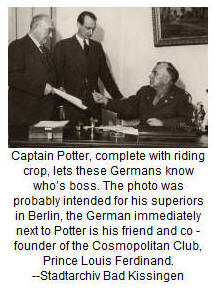
Whatever the specific circumstances, in the late Spring of
1945, Captain Merle Potter and his team were assigned to
take over the administration of Bad Kissingen. All across
Germany, dozens of teams fanned out to similar assignments.
Potter had received the specific training for the assignment
in England as the European Civil Affairs Regiments were
being built at the same time as the invasion forces were
assembled. Later to be known as Military Government
Officers, the detachments received some very basic military
training and then intensive language training and civil
affairs instruction. The teams were faced with re -
establishing some level of civil services in Germany, a
nation by and large, bombed back to the 17th century. Merle
Potter took his position at center stage and was about to
play the greatest role of his life.
Frank McInerny’s Around the Town column from mid Summer 1945
reported that Potter was now the Military Governor in Bad
Kissingen and then,
“Captain Merle Potter writes … that the krauts,
particularly those in the entertainment business, never miss
an opportunity to belittle the U.S. denazification program.
He cites a bit of dialogue between two stage comics. A well
dressed man is sweeping the streets and passerby shouts -
Hey professor, how come you are sweeping the streets? The
reply - Ohh, I got fired as a professor because I was a
Nazi, now I am a street sweeper. The first man then answered
- Well I lost my job as a street sweeper because I too was a
Nazi … what shall I do now? “
Later that year, AP reported that Captain Potter, disgusted
over the constant anti American rumors that were being
reported to his office at the Rathaus ( city hall ), had
ordered an investigation and determined that one Fraulein
Magdalene Schoel was the source of many of these lies and
had her proclaimed - The Official Gossip Monger of Bad
Kissingen. The German town fathers were called in to make
this official and the announcement was posted on bulletin
boards across town.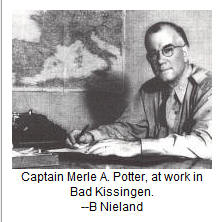
All was not fun and games for Potter and his peers across
Germany. The Army realized that it did not want a long term
commitment in direct oversight of German civil affairs. As
fast as possible, local control was to be handed off to
qualified Germans as long as they were not previously high
ranking Nazis. In the summer, Potter had worked to assemble
a local board to oversee the day to day German civil affairs
of the town. The last German Burgermeister ( mayor ) from
the Nazi period had killed himself at the end of the war.
Potter found a man he felt he could work with, a local
dentist named Alfons Foster but Foster had no desire for the
job and apparently the other prominent Germans in the pool
that Potter found acceptable, had similar feelings. Not at
all happy with the situation, another local Doctor, Franz
Meinow, was found and he agreed to take the job. A great
image from the time finds Potter, center stage, glaring down
at the local German dignitaries who were willing to run Bad
Kissingen as the first meeting came to order.
The German book Vom Kohlenklau zur Chesterfield - From Coal
Buckets ( slang for the German Wehrmacht helmet ) to
Chesterfields ( the American occupation Army cigarette of
choice ) which provided much of the source material for
Potter in immediate post war Bad Kissingen, noted that one
of the other noteworthy early accomplishments of the
Americans was to get the theaters and movie houses up and
running. Movies were carefully pre screened to insure that
there were no pro Nazi or communist messages in the content.
Comedies were acceptable. Max Berger would finally have been
proud.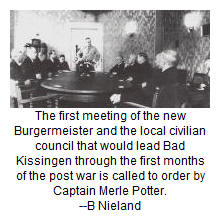
Fraternization was a big issue from mid 1945 well into 1946.
The official policy was to limit the Army from contacts with
local Germans except as strictly required by day to day
activities. At this same time, the Army was organizing off
duty tours, recreation programs and cultural excursions for
troopers throughout the American zone. Americans soldiers
were talking to German kids, talking to German women and
talking to German shopkeepers everywhere. There seemed to be
no sane, understandable standard and for both senior
officers and newly arrived post war occupation troops, there
were prosecutions and punishments if they were caught in the
muddle of German - American relations. GIs chasing German
woman was a particular problem and much of the anti -
American resentment that manifested itself in fights,
muggings and vandalism of Army equipment was traced back to
German men who resented American men.
This was an issue that Potter faced everyday as he looked
out from his corner office on the second floor of the
Rathaus. His immediate view was of the American zone, well
ordered, secured by MPs, a few Germans with work passes
scuttling about. A few blocks away, just out of sight, and
in clear violation of the regulations, Germans and Americans
were interacting in every conceivable fashion.
How Merle Potter met Prince Louis Ferdinand of Prussia , the
grandson of the Kaiser is a mystery. Prince Louis had once
been third in line to the old German throne. When Germany
lost World War I and the monarchy was abolished as a form of
political leadership, the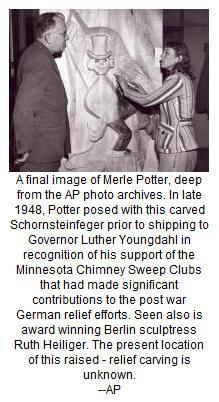 Prince and his older brother
enjoyed the life of affluent curiosities. Prince Louis did
not pursue a career in the military as had his older
brother, but rather traveled extensively to include a
prolong stay in America in the 1920s. He came to know both
Henry Ford and at least briefly, Franklin Delano Roosevelt.
Louis returned to Germany in 1933, when his older brother
renounced any claim to the ‘throne’ by marrying a commoner.
During the war, Louis was neither a Nazi or soldier.
Apparently Louis was barred from the military after his
older brother was killed in France and he spent the war
years in the aviation industry. Prince and his older brother
enjoyed the life of affluent curiosities. Prince Louis did
not pursue a career in the military as had his older
brother, but rather traveled extensively to include a
prolong stay in America in the 1920s. He came to know both
Henry Ford and at least briefly, Franklin Delano Roosevelt.
Louis returned to Germany in 1933, when his older brother
renounced any claim to the ‘throne’ by marrying a commoner.
During the war, Louis was neither a Nazi or soldier.
Apparently Louis was barred from the military after his
older brother was killed in France and he spent the war
years in the aviation industry.
Maybe Captain Potter was bored and needed someone to help
pass the time. Perhaps Louis, in 1946, was the most polished
German to knock on his door holding a bottle of champaign,
two glasses and speaking near perfect English. With the
fraternization issue still an Army concern, Potter and the
Prince became fast friends. Clearly, Potter’s opinion of
Germans was beginning to change.
Merle A. Potter had been a few years earlier, the Commodore
of a local Minneapolis yacht club. In Bad Kissingen, with
the Prince at his side, he declared the opening of the
Cosmopolitan Club, a place for social interaction where
Germans could learn democratic ideals from their new
American friends. The Prince suggested that his driver also
be included on the founders rooster and Potter, unfamiliar
with democracy taken to that extreme, initially said no. In
due course he relented, the driver was given a membership
card and the club opened.
The Office of Military Government - Bavaria - Potter’s
immediate superior headquarters and the Office of Military
Government - Berlin - the supreme headquarters, were very
unhappy with Captain Merle A. Potter. The fraternization
issue was only just being unsorted and the idea of a totally
unauthorized social club involving former members of the
German aristocracy and American Army officers seemed totally
counter productive to their way of thinking. What was going
on in Bad Kissingen?!
Potter was called in on the carpet to explain his actions
and his superiors must have been dumbfounded when Potter
claimed that a social club to teach Germans democracy did
not fly in the face of fraternization regulations. Was this
not just a classroom of another form? Maybe it was the idea
of the Prince and the liquor that bothered everyone. Captain
Potter was fired from the job in Bad Kissingen, threatened
with court martial and sent to a desk at the larger command
in Ansbach where he could be more closely supervised.
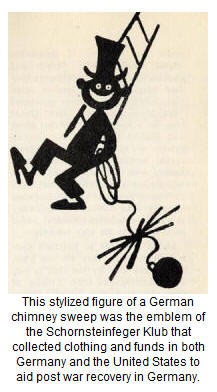
Potter would have none of this, and with an old sixth sense
of how publicity can be put to work, demanded that a
military trial be convened. He stated that he would readily
admit to having given local Germans used coffee grounds from
the American mess back in Bad Kissingen. The giving of any
food, fresh or table scraps, to the Germans had been
strictly prohibited and Potter knew it. He figured that the
trial could be used to introduce the Cosmopolitan Club
ideals to the American people and that the innate sense of
fairness in America would never tolerate the Army regulation
of burning any excess military left - overs rather than
giving them to Germans who were subsisting on a 1400 calorie
per day diet. Potter also called in old friends from
Minnesota to include Senator Albert Ball to intervene on his
behalf.
Office of Military Government - Berlin - sensed a scandal on
the verge of getting out of control and neither granted
Potter his trial or pursued further proceedings against him.
At least for a few months, Potter sat in Ansbach and
continued to strongly advocate for the Cosmopolitan Club and
all that it represented.
One year later, things had changed; Captain Potter had
simply been a man well ahead of his time. By 1947, the U.S.
Government was advocating across a broad front for
educational and social programs throughout their zone of
occupation designed to stress positive German - American
interaction including educational programs encouraging
western political and social ideals. The Amerika Haus
program was fully funded and staffed by the State Department
to include an outpost in Bad Kissingen. Fraternization
regulations were all but eliminated and programs to insure
that German youth was in school, at work and then receiving
positive messages about American democracy became one of the
standing orders for occupation forces then evolving into the
U.S. Constabulary.
American units were encouraged to assist local orphanages,
have Christmas parties for younger children and run Summer
camps for older children and teens. It was a full court
press and Captain Merle A. Potter was summonsed from distant
Ansbach to Berlin to join the staff of General Lucius Clay.
Potter’s mission - build German - American social clubs
across the country and do it fast!
Welcome to Berlin, Major Potter!
It must have been with an enormous sense of gratification,
that Merle Potter joined the special staff for German -
American relations in Berlin. While there, he met the woman
who would become his second wife, was promoted and set about
building the framework for social clubs wherever there was a
significant American military force present in a German city
or town. What he started, soon evolved into the Association
of German - American Clubs. Potter also became involved with
fund raising based in the United States to support local
German recovery. Reminiscent of the 1939 Finnish Relief
campaign he had participated in back in Minneapolis, Potter
asked for assistance from all the old newspaper and radio
hands in the Twin Cities who remembered his name. Needless
to say, Merle was back in business.
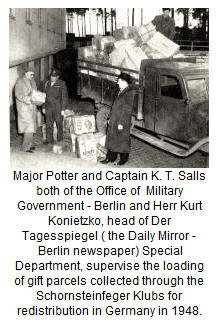
Potter’s fund raising campaign coined the name
Schornsteinfeger Klub - Chimney Sweep Club - borrowing from
the German tradition recognizing good luck comes when one
meets a chimney sweep. His appeals were echoed through the
upper Midwest as he asked that used children’s clothing that
still had value be sent to his office in Berlin for
redistribution. Anyone who contributed became a life member
in the Chimney Sweep Club. Donations poured in from across
the United States and particularly from the Wisconsin thru
the Dakotas region, an amazing transformation considering
that only three years earlier, Potter saw little value in
anything German.
In Berlin, Major Potter coordinated German theater reviews
and shows with the proceeds going to the club account to
purchase additional clothing and raw materials for German
club members to locally manufacture toys for redistribution
at Christmas. As destitute former German POWs were released
from the East, Schornsteinfeger Klubs provided fresh
clothing and other necessities. Coining the secondary name “
International Organization of Persons of Good Will “ at the
height of the membership, the roster listed 16, 000 names
from over ten countries. To thank the American and British
pilots and aircrews spearheading the Berlin Airlift in 1948,
the club raised funds, purchased and presented 750 engraved
cigarette lighters.
By 1949, Merle Addison Potter was out of the Army and ill.
In 1948, Potter’s health had started to decline and it is a
testimony to his spirit that he remained as active as he was
in Berlin with the German - American social clubs and
Chimney Sweep Club. There should have been a second book and
a victory lap allowing Merle to celebrate his successes in
Germany but this was not to be the case. He left the Army,
briefly stayed with a sister in Iowa and then settled in a
Los Angles suburb. His new wife, Edith, a German national he
had met in Berlin, had a career to pursue as an instructor
in the California university system. Merle suffered a series
of strokes that steadily diminished his abilities. In the
1950s he wrote an occasional column for the now defunct
Valley Times of North Hollywood. After a period of very poor
health, Merle A. Potter died in October, 1960 at the age of
66 years. He was buried in a Los Angeles veteran’s cemetery
and choose a government issue marker.
* * *
Prism Images of Merle A. Potter’s Legacy
Considering the hundreds of thousands of newspapers he
helped sell and the millions of readers he entertained with
his columns, book, promotions, and stunts, the Minnesota
papers offered spare obituaries. A few scant paragraphs and
a thumbnail photograph to bid Merle adieu.
The Federation of German - American Clubs directly evolved
from the Cosmopolitan Club, remains a part of the positive
interaction between U.S. forces and German civilians. Over
thirty clubs still exist even after the significant
reductions of American military forces. The Bad Kissingen
club was merged with the Schweinfurt club after the final
American presence in the Kurstadt ended with the closing of
Daley Village. Still giving tours and cookies to G.I.s the
federation has greatly expanded its charter and now is
extremely proud of the many student exchanges and
scholarship programs it offers to both German and American
teens.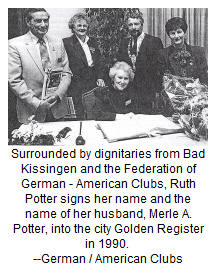
In Germany, Potter is recalled on line and in print media by
the Association of German - American Clubs but to keep
things current, the distant past is collapsed to an image
and a few lines. At a Bad Kissingen history web site, Merle
is on line, an image and caption noting he was the first
American Army Governor of the town and a small reference to
the Cosmopolitan Club.
Edith Potter remained very active in the German - American
Clubs and was teaching courses in German language and
culture at Scripps College in Los Angeles through the early
1990s.
In 1990, the Clubs held their annual reunion at Bad
Kissingen to celebrate over forty years of promoting German
- American friendship as focused through the U.S. Army in
Germany. Edith Potter was one of the significant guests and
she spoke at length on how much the organization had meant
to her and her husband over the years. With Merle Potter
long gone, she was afforded the highest honor the Kurstadt
could afford a visitor. To honor the role that Merle A.
Potter had played in the post war period in Germany, his
founding of the Cosmopolitan Club, his willingness to fight
for his ideals and then hard work in Berlin and worldwide on
behalf of the German people, Edith Potter was invited to
sign her name and greeting into Bad Kissingen’s Golden
Register, an honor dating back over two hundred years. To a
roster that includes, kings, queens, royalty and significant
statesmen from Bismark to Brandt to Adenaur, Edith Potter
added her name and that of Merle Addison Potter.
|
|